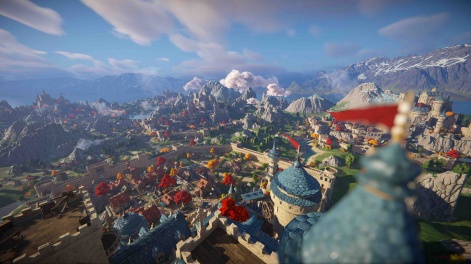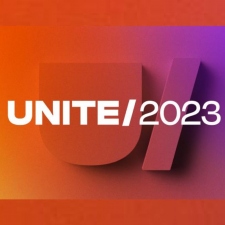Unity has been front and centre for a growing number of games developers for years now and their big bet on the implementation of AI as the way to seal the deal and power ahead has been no secret. Now at Unity Unite, their conference taking place in Amsterdam right now and their first in four years, that 'secret' is out.
Having teased the future and even announced endeavours such as Unity Sentis their next big reveal became obscured as their plans to revise their pricing structure (and the introduction of the now notorious Unity Runtime Fee) eclipsed the hard work they'd put in place and bumped Unity 6's introduction until after the dust had settled.
Now, it appears that sufficient water has passed under the PR bridge and Unity are - they hope - all set to resume pro-active, future focused business as usual again. Albeit 'business as usual' with a distinctly AI-powered twist.
A game of three halves
Today Unity are taking the wraps of three main new initiatives all designed to work together allowing devs to get in deep with Unity and take advantage of all the new features (via a pricing structure that's tailor made to suit) or simply to cherry pick-n-choose whichever parts suit you best.
In brief, that's a whole bunch of AI-powered features, the debut of the Unity Cloud collaboration service and - of course - the all-new Unity 6 package that forms the centrepiece and binds together what being a Unity developer is all about.
Unity has been increasingly stepping away from their perceived role as 'dev tools for games' with today's announcement proudly pitching them as "the world’s leading platform for creating and growing real-time 3D (RT3D) content". It's a label that's fair and well earned. Acquisitions and integration such as their purchase of special effects giants WETA have really opened up what Unity means and where it can be used.
In a world of increasingly digitally derived content it's clear that Unity sees no aspect in which they couldn't play a part.
To tackle the knotty issue of artificial intelligence and its role in future content development head on, let's break down what's new with a look at Unity Muse, their suite of AI-powered features "to simplify content creation".

AI for everything
Unity Muse and Unity Sentis, their new AI-powered platforms have already been launched into closed beta and from today Unity Muse is launching in early access.
In short Muse is an AI assistant in three parts. Muse Chat will provide answers and resources across Unity and can be used to produce "usable code" from text prompts. Ask for a feature and Chat will make the code. That's the plan.
Muse Sprite can be used to quickly generate 2D sprites and multiple variations, in theory greatly speeding up the creation of in-game assets (especially on mobile) where valuable person-power can too often become swamped in the repetitive process of creating art assets.
Finally Muse Texture can be used to generate high-quality 2D and 3D ready textures and (like Muse Sprite) comes powered by a custom-built deep learning model trained entirely on data and images that Unity owns or has licensed. This last point is super-important as while the grey mist of 'who owns what' in AI creations continues to swirl, users of Unity Sprite and Texture can know that everything the AI kicks out is theirs to use, no debate necessary. "This ensures the datasets do not contain any people, logos, or recognizable artistic styles," says Unity.
Sounds good. So how much?
Typically for Unity (and a welcome relief after the Runtime Fee farago) Unity Muse is available for $30 per month as a standalone product "with subscribers receiving priority access to upcoming features in pre-release."
Oh yes, Muse isn't done yet. Coming soon will be Muse Animate, which allows developers to set characters in motion without code; Muse Behavior, which lets developers set up character interactions; and Muse Sketch a "3D canvas for rapid prototyping and team collaboration".
Rounding off the AI fun, and getting rather more heavyweight beyond the workflow improvements in Muse, is Unity Sentis, designed to allow developers to bring complex AI data models into the Unity Runtime "to help solve complicated tasks and create new functionality in a game using AI models."
Now in open beta, Unity Sentis will be launched alongside Unity 6 at a currently TBC date in 2024.
Unity's 6 of the best
Next up is the big one. Unity 6 is Unity’s next major software release, due in 2024. While 6 broadly aims to "push the visual quality scale to create larger, richer worlds as efficiently as possible", new features touched upon include substantial performance enhancements, next-level mobile features, accelerated multiplayer game creation and scale, "innovative" VR device support and - of course - AI support.
“We are here to help developers build amazing games and find success,” says Marc Whitten, president Create, Unity. “Central to our work is their feedback. They tell us where we are helping them and they tell us when there is more work to do. In Unity 6, this means focusing on performance and workflow improvements. In AI, it means working to make sure they have tools to build more, faster. We want to be a true partner, addressing our creators’ needs at any point of their game development lifecycle.”

All up in the Cloud
Rounding off Unity's new triple threat is Unity Cloud, a new set of connected tools for developers who work together to streamline pipelines, organise content across multiple projects and "bring order to the complexities of the development lifecycle". Now in early access all Unity Personal, Pro, Enterprise and Industry subscribers have access to Unity Cloud.
Plus, from today, Unity is opening up its PolySpatial visionOS beta program for the development of content for Apple's yet-to-be-released ($3,499) Vision Pro headset using Unity's Editor and Runtime. PolySpatial will be available for all Unity Pro, Enterprise, and Industry subscribers
That's a lot to take in and we'll be back with more in-depth looks at each and every part of Unity's new offerings - Muse, Cloud, Spatial and Unity 6 - soon.






















